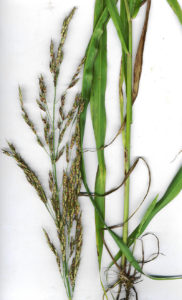Johnson grass or Johnsongrass, Sorghum halepense, is a plant in the grass family,Poaceae, native to the Mediterranean region, but grows throughout Europe and the Middle East. The plant has been introduced to all continents except Antarctica, and most larger islands and archipelagos. It reproduces by rhizomes and seeds.
Contents
Uses
The seed is demulcent and diuretic.
Benefits
It is used in traditional medicine in the countries it grows in to treat a number of ailments wherever it grows. For example in Nigeria it is used to prevent miscarriages, as a soothing agent for the mucus membranes and to aid digestion, as a diuretic and to soothe the skin. It is also used as a poison. Sorghum bicoloris also used to treat stomach aches, cancer and epilepsy, and the seeds are made in a decoction for diarrhoea. The stem is used to reduce tubercular swellings. It is also used for anaemia sufferers and as a blood purifier and tonic.
In India jawar is used to get rid of intestinal worms and as an effective insecticide as there are phenolic compounds and tannins in it which keep insects at bay.
In Brazil a decoction of the seeds is given for respiratory problems, for example bronchitis, coughs etc as well as for kidney and urinary tract problems. In medical research it has been found that the aqueous leaf-sheathe extract of S. bicolor can protect the liver and could be a treatment for anaemia.
Cautions
The pollen can induce hay fever.
Interactions
None are recorded.
Other names
Sorghum halepense, Holcus halapensis, Sorghum miliaceaum
References
Source: Wikipedia, https://en.wikipedia.org/wiki/Johnson_grass
NaturalMedicinalHerbs, http://www.naturalmedicinalherbs.net/herbs/s/sorghum-halepense=johnson-grass.php
Herbs – treatandtaste, http://herbs-treatandtaste.blogspot.bg/2011/07/what-is-sorghum-jawar-history-health.html

